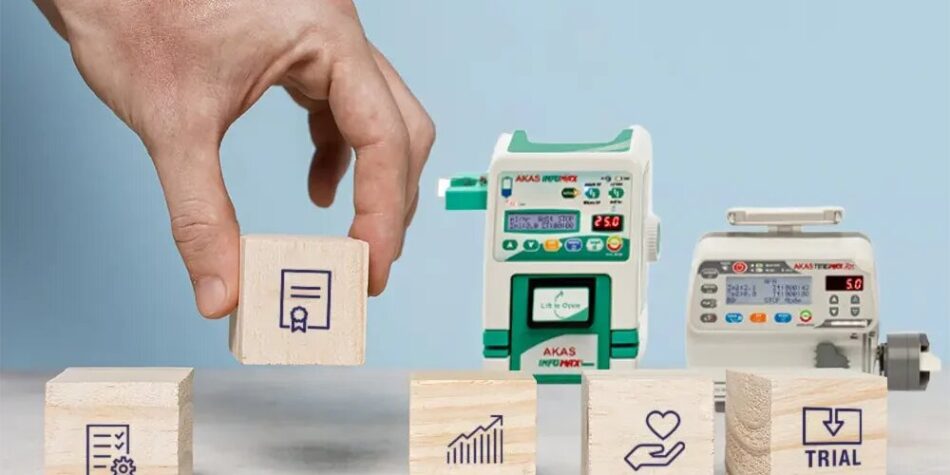Introduction
- Safe, accurate, and timely drug administration is at the core of quality hospital care.
- Infusion pumps have emerged as essential tools in ensuring consistent and controlled medication delivery.
- As healthcare needs evolve, so does the demand for innovation in infusion pump technology.
- Medical institutions now face the challenge of balancing efficiency with patient safety.
- Infusion pumps meet this need by offering precision that manual administration cannot guarantee.
- With modern advancements, they are not just supportive devices—they are central to hospital workflows.
- From intensive care to paediatrics, infusion pumps are integrated into every major department.
- Their reliability helps clinicians focus more on patient care and less on procedural complexities.
- Understanding the impact of innovation in infusion pump design is vital for selecting the right solution.
How Technology Is Redefining the Infusion Pump
- The evolution of the infusion pump reflects the broader transformation of healthcare through digitalisation.
- Smart features now allow pumps to be more responsive, connected, and intuitive than ever before.
- These advancements directly support higher accuracy, reduced medication errors, and better outcomes.
- Modern infusion pumps come equipped with features tailored for hospital-wide integration.
- From wireless connectivity to real-time alerts, each element is designed to enhance clinical safety.
- Continuous innovation ensures these devices adapt to new medical protocols and challenges.
Key Technological Advancements in Infusion Pumps
- Smart Drug Libraries: Pre-programmed safety limits reduce human error and support protocol compliance.
- Real-Time Monitoring: Pumps alert staff to flow interruptions, occlusions, or air-in-line risks.
- Wireless Integration: Enables synchronisation with hospital EHR systems for seamless data sharing.
- Battery Advancements: Long-life rechargeable systems support emergency and mobile care situations.
- Intuitive User Interfaces: Touchscreens and visual cues reduce training time and streamline operation.
- Compact Design: Space-saving, transport-friendly units improve flexibility in crowded hospital settings.
- Multi-Channel Capability: Allows simultaneous delivery of different drugs with independent control.
- Automated Logs & Reports: Tracks infusion history and supports audit and compliance needs.
- Remote Control Features: Enables adjustments from central nursing stations for critical care patients.
- Voice Prompts and Colour Alerts: Improve user engagement and alarm recognition for faster action.
Benefits of Innovative Infusion Pumps for Hospitals
- Improved dosing accuracy plays a pivotal role in medication safety and patient recovery.
- Automated control prevents over-infusion or under-infusion, particularly during complex therapies.
- Clinical staff gain more confidence and efficiency with devices that simplify critical functions.
- The integration of infusion pumps with digital records ensures accurate charting of dosages and timing.
- Hospitals benefit from data-driven insights that can guide patient care improvements.
- With better data access, physicians can personalise treatments and monitor trends more effectively.
- Training is simplified through intuitive displays and standardised operating procedures.
- Faster onboarding leads to fewer operational errors and better use of clinical time.
- Such features are especially vital in emergency departments, ICUs, and surgical theatres.
Why Modern Infusion Pumps Are Crucial for Clinical Excellence
- Hospitals are under pressure to enhance care while meeting strict safety and efficiency standards.
- Infusion pump innovation directly contributes to these goals through better reliability and responsiveness.
- These technologies support critical procedures where timing and dosage can be life-defining.
- Paediatric and neonatal units require pumps that handle minuscule doses with absolute accuracy.
- Oncology departments depend on infusion precision to deliver high-risk chemotherapeutics safely.
- Surgical units rely on pumps to deliver anaesthetics and fluids consistently throughout procedures.
Considerations When Choosing an Infusion Pump Manufacturer
- Selecting the right infusion pump manufacturer is a long-term investment in patient care.
- A good manufacturer offers more than products—they provide trust, service, and clinical understanding.
- Institutions must evaluate both the technical features and the support ecosystem behind the product.
Key Factors to Evaluate:
- Clinical Accuracy: Devices should maintain exact flow rates under all operating conditions.
- Safety Features: Pumps must meet global safety standards, with advanced alert systems in place.
- Ease of Use: Intuitive controls support faster staff adoption and fewer operational errors.
- Device Durability: Long-lasting hardware reduces the need for frequent replacements.
- After-Sales Support: Reliable training, maintenance, and technical guidance are essential.
- Scalability: Solutions should grow with hospital demands across departments.
- Compliance and Certification: Regulatory approval confirms that pumps are safe and effective.
- Manufacturer Reputation: A proven track record in healthcare builds confidence and continuity.
- Innovation Pipeline: Future-ready design ensures compatibility with emerging hospital systems.
- Cost-Efficiency: Long-term value outweighs upfront pricing in high-quality medical technology.
Conclusion
- Infusion pump innovation is no longer optional—it’s a necessary foundation for modern hospital care.
- By investing in advanced drug delivery systems, hospitals not only enhance safety but also optimise clinical outcomes.
- Choosing the right infusion pump means partnering with manufacturers who understand the delicate balance of care and technology.
Akas Infusion manufactures world-class drug delivery devices, including volumetric infusion pumps built for clinical precision, safety, and ease of use. Their commitment to quality ensures that hospitals, clinics, and healthcare professionals have the tools needed to meet today’s challenges and tomorrow’s advancements in patient care.







